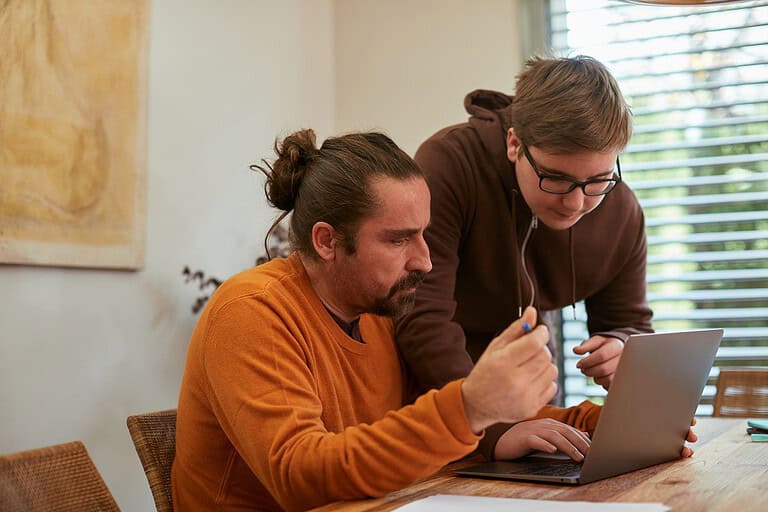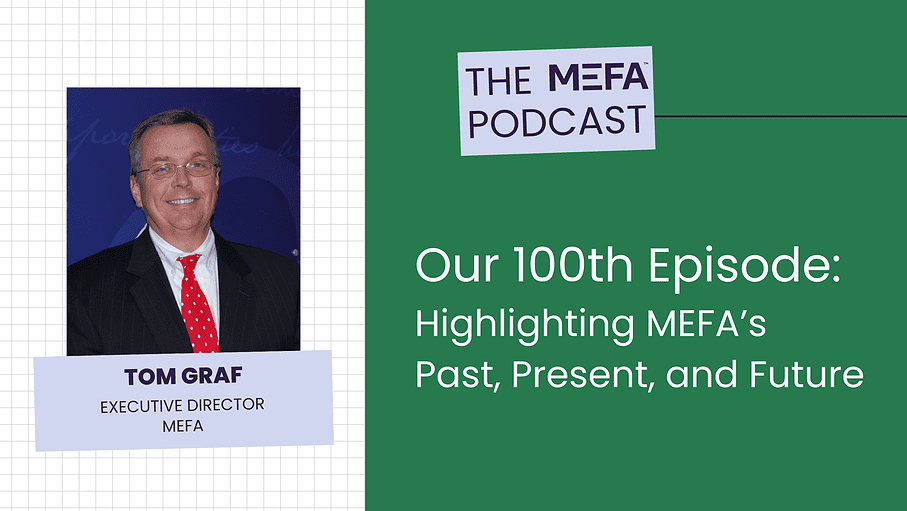Resources Mentioned in this Episode
Jonathan Hughes: [00:00:00] Welcome to the MEFA podcast, everyone. My name is Jonathan Hughes. We have a special. show for you today. This is our 100th episode and I’ve invited MEFA’s own Executive Director Thomas Graf who will talk about MEFA’s mission and the work that we do. In addition to that, we wanted to pull together a compilation of clips from past podcast episodes that cover planning, saving, and paying.
So make sure to stick around for that. But first, here’s my interview with Tom and we’re grateful for having him join us today. Alright as promised, we are joined today on our 100th episode by MEFA’s Executive Director, Thomas Kraft. Welcome to the show, Tom.
Tom Graf: Thank you, Jonathan. Much appreciated.
Jonathan Hughes: We have been doing this show since 2020.
When you think about that time, the past four years or [00:01:00] so, the first 100 episodes what sentiment would you like to express?
Tom Graf: Yeah, first I’d like to thank the the folks that participate and watch the podcast. We started this just over four years ago and, have increased the number of people participating and that’s that’s another way for us to communicate with families as they try to navigate the process.
And certainly all the guests we’ve had on over time, and the MEFA people have put a thought into it. I think this is we started this just after COVID as we realized that the in person meetings were, for a while and we know we had to our mission is to help families and we needed to communicate with them.
And the podcast was one of many ways we started. I think it’s the started in June of 2020 and it was a great way to, to communicate with parents on their time, not in a high school on a Tuesday night at seven 30 in the evening, but When they have time to participate, whether it’s to watch it or as often happens to listen to the podcast while they’re doing something else.
We certainly appreciate people [00:02:00] participation. We we have learned a lot about what is of interest to them and have tried to create different podcasts to answer those questions. I think we would continue to solicit the ideas. It’s not about what we think people want to hear. It’s about what they need to hear to navigate that process.
And it’s not just at the end when they’re, trying to apply or pay for school, but it’s all through that process and timeline for parents.
Jonathan Hughes: Since you mentioned the whole timeline, we talk about planning, saving and paying for college. And we have for many years. But that’s really.
Broadened in the past few years. Can you talk about how what we’ve done has become more broad, more deep as well?
Tom Graf: Yeah, no, I think that’s, that has been a goal of the past 10 years is to really parents to be in the best position really need to start as early as possible. And I think sometimes families only think about school when their kids are juniors or seniors and thinking about paying.
And we’ve really tried to be. An asset all across that timeline, starting with the kind of whole planning idea and saving gave us a [00:03:00] real opportunity to talk to parents at the earliest stage that, if you really aspired to go on to higher education, one way you can mitigate those costs was to save.
And we have a number of programs aimed at folks who have just had, children to get them engaged and by getting them engaged then we can start to talk to them across that whole timeline Providing content that speaks to them at that age whether you have a three year old or a 15 year old or an 18 year old so have really made a concerted effort to try to fill in those gaps and so You know parents can not just one and done, but can keep coming back to find out, am I keeping up?
Am I doing what I need to do? So it’s I don’t think we’re done with that. I think there’s still a lot more to do there. We a number of years created a a pathway, which is a, was at the time was a college and career kind of planning tool. With the goal largely when we created it was to increase the number of folks going on to four year schools.
Time has changed. [00:04:00] And although that tool is still there, we’ve expanded it into thinking about careers and talking to families and students about, who are you and what do you like to do? And how does that translate into a career? And if that’s a career you’re interested in what kind of education would you need to do that?
The need for that kind of information is growing all over the country. We’re trying to fill that. We’re still, there’s still a lot to do there. We work with this administration and past administrations, the Department of Elementary and Secondary, to meet their goals, which is to help those students figure out if a career is maybe the best first move for them.
Jonathan Hughes: I’m going to throw you another curveball now and ask you about the other sort of direction in which we’ve grown in the past few years and that is the attainable.
Tom Graf: Yeah it’s a great point. I think I think a number of years ago all over the country, these attainable savings for disabled individuals were starting at the federal level and then at the state level of the legislature.
Even though it didn’t directly fall into what we did thought, we [00:05:00] did a really good job on saving for college and gave us the attainable program. And the kind of whole idea behind it was if a family can save for their child’s, future education, why shouldn’t they be able to save for their child who might have a disability for the expenses of that might be extraordinary for those disabled individuals.
So I’ve really jumped into that and think it’s a really worthy issue. Have expanded our footprint into that hired staff and folks to, really work with families who are. Maybe even more than trying to figure out, what school for your child to go and figure out how, you can best assist your, child who may have some disability and working with a group like Fidelity to help them save and maximize their saving or their savings goals has been, I think, very rewarding for us as a, and our staff and the ABLE side.
Jonathan Hughes: So looking ahead to the future, what do you see on the horizon then for MEFA?
Tom Graf: First just to hearken back to had a chance to look [00:06:00] at the several of the episodes, podcasts over the years, and just recently look at the first one. And the content has always been, really good and informative, but technology has improved dramatically.
So anyone who has the opportunity to go back, I think it was June of 2020, we did something about navigating the process during COVID. Which was very timely or up till today, celebrating a hundred podcasts and look forward to the next hundred. I think it’s a worthy investment of people’s time.
It’s a worthy investment of ours. As I said, maybe earlier on people digest information in a variety of ways. The podcast is a really good one. There’s a number of other ways, whether it’s our website or newsletters or emails or texts, we’re always trying to find a way to get information to parents and provide it in a manner that when they’re ready for it, it’s there and they can come get it.
Even though we’ve been through a hundred podcasts. There’s still plenty there in the library and would, suggest that families take a [00:07:00] look at that. As far as going forward, certainly changes continue to happen at the state and federal level. So we’d like to think we can stay on top of those and constantly update families about what’s happening or what they need to do.
Certainly this past year on the FAFSA. Our team jumped into that and we spent an enormous amount of time to help families. We didn’t always have the answers because they weren’t available at the federal level, but we could give them the newest information and provide some relief that, that they were doing what they needed to do at the time.
So certainly responding to the changes that happen from From a career standpoint as the focus becomes more and more about careers, I think these podcasts and other content we provide, really we’ll get deeper and more informative in that regard. And also really solicit, as I said earlier, what parents need to know in that anxious moment, whether it’s when you’re feeling overwhelmed about savings or when you’re trying to [00:08:00] figure out how to pay reaching out to us and our team and having a direct conversation with one of our folks or suggesting a topic for one of these podcasts.
I think we like to think we know what people want to hear, but it’s best to hear it directly from them. And then we turn around and produce the information.
Jonathan Hughes: Any final message to families before we go?
Tom Graf: Just to suggest they stay engaged and participate. It’s a that process sending one on to a career or further education is, can, that analysis is, can be time consuming.
It can be expensive. The earlier you start, the better off you’ll be, the more educated you are about what’s out there and how you participate in that, I think is important and will alleviate some of that, maybe some of the financial burden and certainly some of the anxiety that might come with it.
Jonathan Hughes: Thank you so much. Excellent.
Tom Graf: Thank you, Jonathan.
Jonathan Hughes: All right, and I hope you enjoyed that. Now [00:09:00] let’s move on to our compilation of clips that highlight everything that MIFA can do for you. from planning, saving, and paying for college and career readiness. So what do you say, Julie? Should we get to it?
Julie Shields-Rutyna: Let’s do it. And let’s start with saving. MEFA is proud to offer two fantastic college saving programs.
The UPLAN prepaid tuition program, which we talked about all the way back in episode four. So you can check that episode out to hear more about the UPLAN. And the one that we’re going to hear now is about the other plan, the U Fund, which is the Massachusetts 529 plan. In particular, we thought we would start where most families start for saving at birth with Baby Steps.
And this is an initiative that launched in January of 2020 and was spearheaded by the Massachusetts Treasurer’s Office. So let’s go back to Episode [00:10:00] 10, which aired February of 2021, and hear from Elena Van Tassel from OE to hear all about that program.
Alayna Von Tassel: This program launched on January 1st of 2020, and basically starting this past January, All babies born or adopted here in Massachusetts have access to 50 into a 529 count through MIFA when they open up a 529 plan.
Families have until the child’s first birthday or until the first anniversary of their adoption, the child’s adoption, in order to access the 50. When they have the child in the hospital, there is the parent worksheet for getting the birth certificate form right on that worksheet. Families can check the box right on there to indicate interest in the program.
That information is then sent to the treasurer’s office into MIFA and then we’ll [00:11:00] contact the families to help them get started in helping them to open up the 529 account. It really makes it very easy to help families start saving early.
Jonathan Hughes: That was great. And the thing that I really love about doing this show is getting to hear not only from our great partners like Alayna, but also from average folks, savers, parents trying to send their kids to college.
So let’s go back to episode 28 to hear from a parent of a young child in Massachusetts who is saving in the MEFA UFund. One of our guests, Kate Ryder, is going to share her experience.
Kate Ryder: Yes, we actually started saving and started the account before we even tried to get pregnant.
Jonathan Hughes: Oh, really?
Kate Ryder: Yeah, we were married, we knew we wanted kids, we were still figuring out the timeline, but we figured, hey, we can always set aside some money now for the kids in the future, just give it as much time as possible to grow.
So we set up the account, a couple months later decided to get pregnant.
Jonathan Hughes: So what was that [00:12:00] like setting up the account? What was the process of doing that? And then once your child was born, how did you switch that over?
Kate Ryder: So setting up the account was really straightforward. There wasn’t much to it. It was just creating the account.
Getting all the information that you need whenever you set up an account, but nothing like extra or super confusing. Once he was born, we created a new account for my son and we were able to move the funds over. And that was pretty seamless. And we just switched the money over and it’s been pretty simple.
And we even had to call Fidelity at one point to get clarification on some stuff and they were super helpful.
Jonathan Hughes: If I can ask how you contribute to the program.
Kate Ryder: Yeah, we did an initial contribution, and then we also opened it up to anyone who wants to give it as a gift. So like our parents our siblings will maybe offer a gift during his birthday or Christmas or something because he has enough toys.
So this is a great alternative plan for them filling my house up with more stuff. We also do a monthly contribution. So just a little bit more every month.
Julie Shields-Rutyna: As [00:13:00] Kate mentioned, it’s not just parents who can save for their kids. You can get family and friends involved in helping to save for college.
And so that brings us to a recent clip from episode 97. Here, I’m talking about a new way that families can do this. And this is exciting. I’m excited about this. After many months of preparation, MEFA is pleased to announce that UFund gift of college cards are now available at CVS locations across Massachusetts.
And so you can purchase a MEFA UFund branded gift card in amounts ranging anywhere from 25 to 50. And then you can give that as a gift to a prospective parent, a parent or a child for a birthday, a graduation, or any other occasion that you’d like. And then the money can be redeemed. So the idea is, someone would take that and then the the recipient would put that [00:14:00] into a U Fund.
But, People have other options, too. Of course, the U Fund is our Massachusetts 529 plan but it can also be invested in another college savings account, any of them really, across the country, like any other 529 plan, which includes the U Fund. But also, MIFA has our U Plan which is our other savings program, and it can be put into that prepaid tuition plan.
It can also be used for an ABLE plan. So if someone has an ABLE account, you can put it in there. Or, this makes it so flexible, it can also be used as a payment against a student loan.
Jonathan Hughes: All right, now you heard Julie in that clip talking about another offering of ours, Attainable. And that is the Massachusetts ABLE 529A Plan for Individuals with Disabilities.
Now this is also a sort of education savings program because it can be [00:15:00] used for education, but there’s a lot more uses for it. But let’s hear from MIFA’s Director of Attainable Outreach. Adam Hartwell described it in episode 93.
Adam Hartwell: ABLE is the Stephen Beck Jr. Achieving a Better Life Experience Act, which was signed into law in 2014 by President Obama at the time.
It was a change to the IRS code. A lot of people are very familiar with ABLE. 529 college savings plans. This is 529 a and has a lot of things in common with it. 529 is saving for qualified educational expenses. 529 or is an investment account that saves for qualified disability expenses. This allows you to not only save money in general on these tax advantaged investment accounts, but Perhaps more importantly, money in an ABLE account does not affect federal public benefits.
And for a lot of states, Massachusetts being one of them, a lot of times when we’re talking [00:16:00] about the state benefits, they follow the lead of the federal benefits as well. So each state gets to have their own program and name it their own way and what have you. So here in Massachusetts, we have the Attainable Account.
It was very cleverly named, you gotta attain ABLE. So that is the Massachusetts version of ABLE. www. attainable. org These accounts are not silver bullets. They don’t solve every problem that exists. But having a way to save money is always a good. Being able to have it in a tax advantaged account that has growth because it’s an investment is even better.
Jonathan Hughes: Alright, now let’s head to middle school. Do we have anything for middle schoolers, Julie?
Julie Shields-Rutyna: We certainly do. Grade six is when students can either on their own or through their school, if their school participates, open up an account with MEFA Pathway. So that’s MEFA’s free college and career portal. This is a tool that’s can be used for students in grades six through 12 and beyond.[00:17:00]
And it’s meant to be a resource for students to manage their classes, their college search their career search. It allows them to apply to colleges all of that. But in middle school, it really starts with self exploration. So let’s go all the way back to episode 19 to hear from MIFA Pathway director, Jennifer Bento Pinion.
Jennifer Bento-Pinyoun: So MEFA Pathway is a complete comprehensive web based portal that’s open to students in grades 16 to 12. It’s designed for career exploration and discovery with a fun, engaging, intuitive. Colorful interface. So it appeals to all students. The platform offers age appropriate activities and content that aligns the student on to help them with their post secondary planning.
The portal is available for students opened in grade to grade 6 through 12. So any student can register. As a new user and regardless of if their [00:18:00] school uses the platform, and we currently have 109 what we call affiliate schools in Massachusetts that have embraced me for pathway as their integrated into their curriculum.
So any student can use the platform. They sign in and register as a new user. They all have, access to all of the features within the portal. We have a dashboard that lends itself to helping the student through steps through that journey. If a student creates an account in grade 6, 7 or 8, a lot of what they start to build on within the portal.
In the platform transitions with them to grades nine through 12.
Julie Shields-Rutyna: Okay. So the college process really heats up in junior year of high school. And one of our favorite guests was Mark Stucker from your college bound kid. So this is another great feature of the podcast. We get to bring in insights from national experts and his area of expertise is college admissions. So this is episode number [00:19:00] 43. Key insights into college admissions. Let’s take a listen to what he has to say.
Mark Stucker: Both Yale and Harvard produce this list every year. You just look up where Yale law school students went for undergrad, where Harvard law school students went for undergrad. I love showing that to families.
They will see a range of schools. They’ll see designer names on there. They’ll see flagships, but they’ll see regional publics. They’ll see open enrollment schools. They’ll see such a range of schools. And it’s a good way of showing that any school can take you where you’re trying to go if you, if you work hard and you do something you love and you’re good at and you have a good network and you’re doing something, and you employ some of these other skills like motivation and drive and persistence and resilience networking and people skills just take people really far.
And now all of those students, they had really high GPAs. They tended to do really well on the LSAT. [00:20:00] I know that their recommendations would have been great. I know their writing was great. I know they had great, practical experiences, internships and things. So it’s not like they’re just willy nilly admitting anybody.
But the point is, if you talk to anybody that does professional school admissions or graduate school admissions, they will say one of the big misperceptions out there is that we’re only interested in elite schools or elite schools is a major advantage. You know versus other schools like we’re looking for people who did extremely well where they went and we’re and there’s talent everywhere
Julie Shields-Rutyna: Now not everyone goes from high school to college. In fact, many more students are choosing not to follow that path So we’ve highlighted a few career pathways and there will be more to come But we were lucky to be able to highlight a unique trade school in Boston. Actually the first trade school in the country, the North Bennett street school in Boston’s historic North end.
Let’s go to episode 89 and [00:21:00] hear from the director of admissions there, Rob O’Dwyer on the opportunities it offers.
Rob O’Dwyer: My name is Rob O’Dwyer. I’m the director of admissions here at North Bennett Street School Director of Admissions and E nrollment for the accredited career training programs. There are nine of those programs.
They are bookbinding, locksmithing, jewelry making carpentry, preservation carpentry, piano technology, advanced piano technology, and violin making and repair. I think that we all, as people, want to be and feel useful. Everything that is done here is useful for someone else. And I think that as people, we, naturally, I hope, want to help each other.
And so in making the chairs that you’re both sitting in, a table that you might sit at, a house that you might live in, these things are all very directly [00:22:00] useful to other people. There are other things that I think lend themselves to more aesthetics. The sound of music, piano technology Making a violin, which is also woodworking, but also creating sound ultimately that helps to lift people’s spirits and remind people how beautiful the world is.
Jonathan Hughes: Such a fun show. The bulk of our episodes and the bulk of questions that we receive at NIFA have to do with college financing and financial aid. They come from parents of students that are applying to college, in most cases applying for financial aid, and they have questions. So yeah, most of our shows concern all sorts of topics related to how students and families Paid for college, so we have a lot of those episodes, so we were trying to again, rack our brains to figure out which clip we should highlight. Should it be Northeastern University’s Jim Slattery?
Jim Slattery: For example, on the CSS profile, the profile offers more [00:23:00] detailed information, which. I already alluded to is a good thing, but the profile also has a free form, which you’re alluding to, where it says, tell us about special circumstances. This, we acknowledge that this is a standardized form, and you may not be a standardized family, so what’s different about you?
Or what has changed recently about you? What circumstances do you experience that aren’t? Obvious on this form families with who are taking care of elderly parents who are taking care of children or family members with sickness and crazy medical expenses and so on. The profile gives you the chance to list that information.
Now, the only thing I’ll add to that, use that, think of that as a flag and a starting point. I would urge families not to think of that as a solution. What do if you really have crazy circumstances, it’s not crazy, but special circumstances that should be brought to the attention of the college. get in touch with them individually.
Julie Shields-Rutyna: Or how [00:24:00] about MEFA’s Shawn Morrissey on the new FAFSA changes?
Shawn Morrissey: They’re doing beta testing to make sure that if there are any remaining bugs from the process of last year it is the same process as last year, which at the end of, The Filing time for last year less and less families were having any issues with the FAFSA process last year So they had worked out throughout the year a lot of the bugs already.
So since they aren’t making a lot of changes there shouldn’t be the delays that there were last year. That’s why i’m optimistic I think that they’re really going to be able to meet the december 1st deadline But i’ve heard from a few other people in the industry that You aren’t quite as optimistic as me, but I still remain optimistic about this.
Julie Shields-Rutyna: Gear up, Robert Days!
Robert Dais: The thing I always appreciate about this program, we see a family and a group of students on a longitudinal basis. It’s not a once and done kind of a thing. So we’re seeing you from that awkward 7th grade stage, where [00:25:00] you’re short and you’re growing and you’re going through those stages.
All the way through to when you’re a, you graduate and you’re enrolled in maybe a technical school, or maybe you decide to go into military or whatever you’re pursuing, we get a chance to watch you develop and in the middle of all that, we help you with the transitions, because this is where most students and families struggle is to go from middle school to high school sounds easy, but a lot of our students don’t know How impactful it is to make sure your attendance is strong and you’re passing all your classes.
And a lot of those indicators determine whether 96 percent of you will graduate. So people don’t realize that how you enter ninth grade determines how you exit, whether you’re going to be a stop out or one of dropping out versus completing. And so we want to make sure students are on track with as far as attendance, passing their classes getting on college campuses, filling out a career interest inventory.
Let’s find out what are you excited about, what are you not like? [00:26:00] Let’s just help you begin to understand who you are as a learner, and also so you can move along that trajectory with a purpose.
Jonathan Hughes: Or Andrea Keenan on financial aid and undocumented students. So let’s start with the big question that you addressed for undocumented students, which is basically, can I go to college?
Andrea Keenan: Yes. I, I repeat this over and over again, but somehow, when you are in that position where there’s so much uncertainty about even just being able to reside in the U. S., that’s Somehow I tell students this, and it doesn’t always land or register. I have to repeat it and really reassure them.
Yes, you can. I’ll help you apply. There’s no federal law that prohibits their application to college in the US, but the question often becomes, how do I pay for it? And that’s really where we get into the nitty gritty of being creative of trying to apply for different [00:27:00] scholarships for really using a strategy throughout their process.
Jonathan Hughes: But why don’t we give the last word to you, Julie?
Julie Shields-Rutyna: Why, thank you, Jonathan. The point of all this is to say that MIFA can help you at any point in your educational journey, and there is still so much more that we just couldn’t include here because we didn’t have the time. But not only can MIFA help you, but you can find all of this good stuff right here on the MIFA podcast.
Jonathan Hughes: All right that has been episode number 100 of the MIFA podcast. Congratulations, Julie!
Julie Shields-Rutyna: Congratulations to you.
Jonathan Hughes: Alright folks, and if you liked what you heard today, and you want to hear more from us, you can follow the show. And you can do that wherever you find your podcasts, Please remember to rate and review us.
It helps us to keep doing what [00:28:00] we’re doing and getting this show out to folks like you. So I really look forward to doing this again for another 100 episodes. And throughout that time, we’ve had a great group of people working on this show. Chief among them, thank you to Shaun Connolly, our producer, AJ Yee, Lauren Danz, Lisa Rooney, and Meredith Clement for getting the show posted.
Thank you so much. On episode 101, I’ll be back. My name is Jonathan Hughes, and this has been the MEFA Podcast. Thanks.












